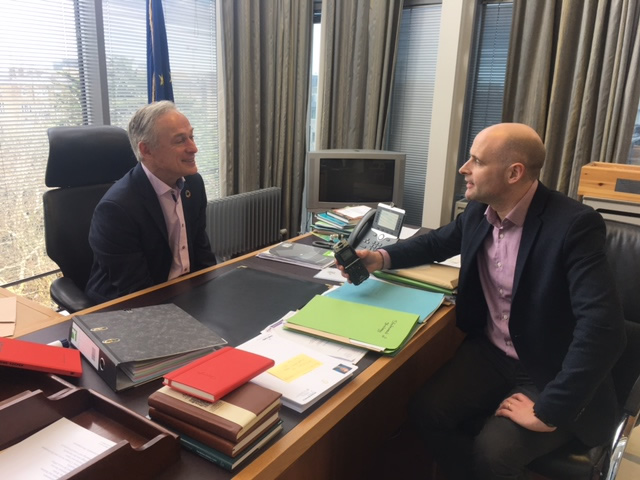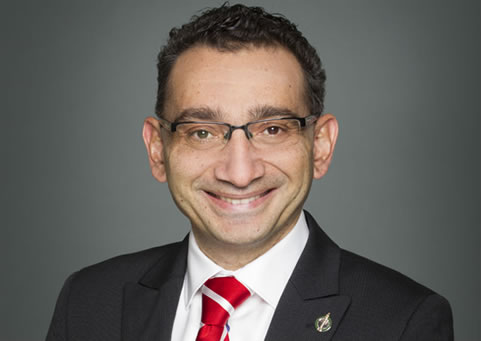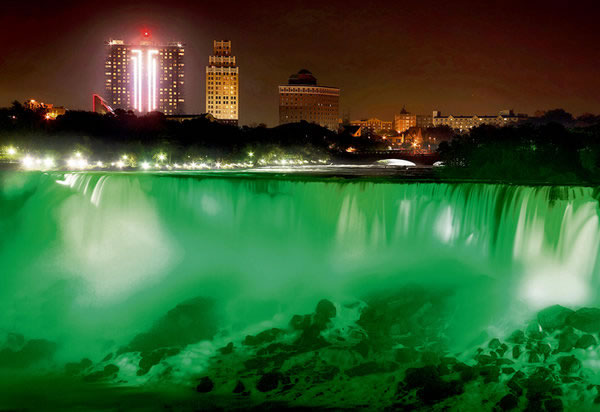22 March 2019

Minister for Communications, Climate Action and Environment, Richard Bruton, recently spent a number of days in Canada as part of the Government’s 2019 St Patrick’s Day Programme.
The agenda was a mix of culture, business and politics, taking in visits to significant historical sites like Ireland Park, and meetings with political figures like Omar Alghabra, MP and Environment and Climate Change Minister, Catherine McKenna. The Minister also switched on the green lights at Niagara Falls for St Patrick’s Day.
Minister Bruton sat down with the ICBA on his return and spoke in detail about the visit in a ten-minute interview which you can listen to below.
We’ve also pulled out some of the highlights which you will find below in lightly-transcribed excerpts.
Meeting Omar Alghabra MP, Parliamentary Secretary to Canada’s Minister of International Trade Diversification

Omar Alghabra MP, Parliamentary Secretary to Canada’s Minister of International Trade Diversification
Canada is faced with a very similar challenge as Ireland post-Brexit. We see our largest neighbour possibly putting significant trade barriers in our way. Canada has suddenly realised also that it’s 75 percent dependent on the US market and that it’s not a market that is quite as guaranteed as it was. So, it was very interesting to exchange thoughts on what Canada is doing with its trade commission to support Canadian businesses internationalizing.
We had meetings with a number of Irish companies there, the common thread was Data Analytics and Financial Technologies and they had developed very good opportunities in Canada solving key problems for Canadian companies. So, it was very interesting to see that on both sides you’re seeing the evolution of new ideas, innovative companies spreading their wings by trading in one another’s markets. At a time when a lot of people talk about protectionism, it’s really exciting to see companies carving out a niche and diversifying and benefiting, and mutual gain – a win-win situation.
Encouraging further Canadian investment in Ireland
There’s been a huge expansion in recent years of Canadian investment in Ireland, and it’s something that we want to encourage. I attended a business breakfast where very high on the agenda was the changing relationship as a result of Britain exiting the European Union and Ireland being the last common law English-speaking country which is a member of the European Union, and there’s no doubt that people in Canada will be looking at Ireland in a fresh light in that respect. So, we have forty very important IDA investors already who have invested in Ireland and we would like to see others follow.
Meeting with Minister of Environment and Climate Change, Catherine McKenna – carbon taxes and rebates

Catherine McKenna, Minister of Environment and Climate Change
It was very interesting to get an insight into what Canada is doing [in the area of Carbon taxes] – they have been pioneers of the idea that we should have a carbon tax with the money refunded. They are proposing that ninety percent of the revenue raised would be returned in a dividend and ten percent would be used for climate action. So, it is very much the idea that the purpose of a carbon tax isn’t to raise funds but rather to encourage people to switch the way they behave in their own home and move away from high-carbon ways of living.
They’ve run into some difficulties because Canada has very independent-minded provinces, and so the relationship between a federal initiative and implementation in the provinces can be fraught. So, there is some pushback in some provinces against these measures and that is a very significant challenge that it is being worked through. I’m not going to comment on domestic politics in Canada, but it does show that anything in this area is a challenge because you’re trying to encourage people to change the way they’re used to living. And in significant states with either a significant shift in the political climate are indeed very strong interests in oil or the like, that poses greater problems.
They also are looking at this concept of transition and how they would manage, and have been managing, particular sectors that are very badly affected by transition. So, for example, they have committed in some provinces to get out of coal altogether and that obviously has had an impact on some traditional coal mining and coal-dependent areas. So, it was again interesting to see what they’re doing in that area.
What can Ireland learn about implementing or increasing carbon taxes from the Canadian model?
I think the dividend idea is one that is very attractive. The idea that it’s clear to the public that when you’re raising a tax it isn’t a question of trying to raise revenue or putting barriers in the way of people, it’s trying to change behaviour for the long term. So, if you receive a cheque in the post, as they are proposing, then that makes it easier for people to accept that this is a good measure.
I think always the problem in relation to climate is people, at a certain part of their brain, accept that it’s a good thing, but to make it possible for them to move on from that, to switch to an electric vehicle or to insulate their home or to change to a heat pump, these things are harder steps and so it is important that you get momentum and get citizens engaged. And I think changing the way the tax is perceived is a really important part of that.

How the Irish government is helping Canadian multinationals to grow
What Ireland did after the crash was rebuild our economy based on enterprise, innovation, and exporting, and that was founded on a very competitive base. And while, yes, as we approach fuller employment there are some pressure points, we currently have the highest productivity growth in Europe, and we’re seeing companies do really well competing in the export markets.
The Government is acutely conscious of the need to improve our skill base. We are already the country with the highest third level participation, the highest number of graduates in STEM subjects, we have a very good regime for people who want to take workers in either from the rest of Europe or indeed from further afield to meet a particular skills shortage. So, we have equipped our economy to be sensitive to the needs of international investors both on the skills front and on the tax front, and we are very competitive in many ways.
We have just published a €120bn infrastructural plan where we’re planning to roll out the infrastructures that will sustain the progress we’re making, and we’ve identified key areas where there is tightness – housing being a major one, transport of course, and other social areas like health and education. So, I think we have a very strong strategy to continue to be an internationally competitive country, the government is acutely conscious of the needs of multinationals who are trading partners for us and we want to encourage that growth.
For more regular insights and presentations from political, diplomatic and business leaders visit the ICBA soundcloud page and subscribe to our newsletter below.
